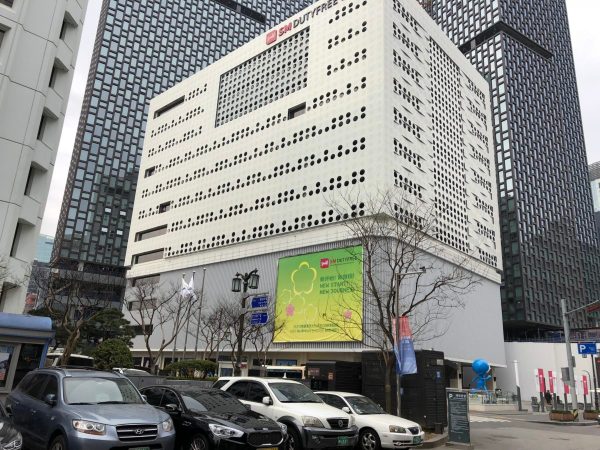Latest posts by Martin Moodie (see all)
- How I overcame Severe Tire Damage to become the oldest influencer in town - April 20, 2024
- Free as a (Kiwi) bird and flying high in Haikou - April 13, 2024
- Discovering Food Accademia’s world of fine flavours at a Hong Kong cha chaan teng - April 6, 2024
Korean travel retail and K-Drama have much in common.
In fact, it’s surprising that no intrepid writer has ever put the rollercoaster fortunes of the country’s duty free and travel retail industry into television script form, so entertaining would it surely be. Perhaps that’s because no-one would believe it.
Maybe I should write the script. After all, I’ve been coming to South Korea each year since 1989 and have tracked this fascinating sector throughout that period. This Blog comes to you from The Moodie Davitt Report Interim Seoul Bureau. I’ve set up base camp at the Somerset Palace Hotel in Jongno-gu, from whence I have a packed schedule of meetings this week with local travel retail executives.
From my window I have an eagle’s eye view of the Jogyesa Temple, which is magnificently illuminated with thousands of coloured lanterns in advance of Buddah’s impending birthday celebrations.




One company here with very little to celebrate is the industry leader, Lotte Duty Free, which yesterday shocked both the travel retail community and the local business and investment world by announcing a -99% fall in 2017 operating profits to just KRW2.5 billion/US$2.38 million for its Seoul and Incheon businesses. Yes that’s right, -99%. And that’s despite revenues being flat at KRW5,453.9 billion (US$5.18 billion).
“Quite a change,” as a Lotte Duty Free executive told me with wry understatement earlier today.
Lotte blamed the collapse on two key points. The first was the disastrous near -50% slump in Chinese tourism last year prompted by the country’s row with China over the THAAD anti-missile system. The second was its sky-high concession fees at Incheon International Airport, which have escalated sharply as the contract at T1 has progressed. Having failed to renegotiate its terms with a hard-nosed Incheon International Airport Corporation (which is taking the attitude that Lotte bid ultra-aggressively with its eyes open and can’t justifiably demand relief now), Lotte has now quit most of its T1 contracts which are being rebid as I write.
What an extraordinary state of affairs. And all this in a Korean duty free market, remember, that posted a +20.7% sales increase last year to a record US$12.8 billion. Sales to visitors in 2017 rose sharply to US$10.6 billion despite a -26.8% drop in foreign customers compared to 2016.

Here’s another telling statistic. The average transaction by foreigners rocketed from US$369 in 2016 to US$624 last year, while Korean ASP increased just by +2.1% to US$109.
Sounds pretty good doesn’t it? So what went wrong for Lotte? Simple. That surging per person spend was driven by the daigou (shuttle trader) phenomenon that as I’ve noted many times before, reached frenzied heights last year. And if anything it’s now escalating. Chinese tour agencies are paying young Chinese people to fly over here on whistle-stop visits, pour into the various downtown duty free shops and buy up their quotas of Korean skincare and, nowadays even more, international and branded beauty, fashion, accessory and luxury items, repack them and return to China where they are sold at great profits.
Sources here tell me that daigou traders are queued up outside Lotte Duty Free’s flagship store in Myeong-dong from 4a.m. awaiting the 9a.m. opening. But the cost of attracting these customers is sky-high, with the specialist tour groups raking in commission percentages that are proving hugely onerous for Korean travel retailers. It’s great for the top-line but far less so for the bottom line. But the dynamic looks as though it’s here to stay. “Korean duty free is now a Chinese sales channel,” one seasoned industry executive told me today.


The post-THAAD return of a more conventional Chinese business can’t come soon enough. There are too many duty free retailers here fighting over a pie that on the one hand is rising but on the other has a base that could crumble at any time.






